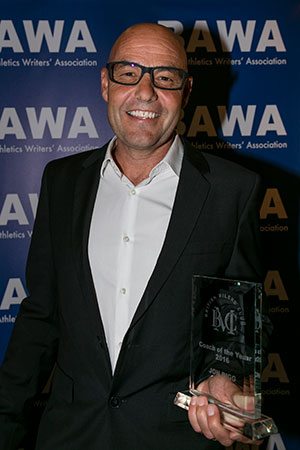I learned a lot from watching Bruce Longden coach my wife Sally. It made me realise how having a plan is everything. You have to know what it takes to make a final then as you develop, look to understand what it will need to win a global medal. Then you need to implement all of that into a training plan that develops your athlete to that point. The skill is not to rush this, but look for long term year-on-year development.
 I believe in altitude, miles and speed. Middle distance athletes need the armoury of a sprinter, the ability to run miles and also to be able to read a race. You can never be too far away from any of these components at any time.
I believe in altitude, miles and speed. Middle distance athletes need the armoury of a sprinter, the ability to run miles and also to be able to read a race. You can never be too far away from any of these components at any time.
Training is a stimulus and the body adapts to it. Therefore you do need to keep throwing different sessions at it. You must not fall into the trap of the same session from week to week just because you know the athlete is good at them.
You should never stop learning. I have been influenced by many people from Steve and Sally in the past to now watching Alberto Salazar coaching Mo Farah. It is all part of a learning curve and gives me great foundation to continue my own development.
I am on a part-time contract with British Athletics to help support the endurance set-up. This has been fantastic for me, as I have been to two major global games where I have learnt lots about the intensity of this level of competition from a coach’s perspective.
Charlie Grice (pictured above), Shelayna Oskan-Clarke and Michael Rimmer are all members of my group. I have learned a lot from Michael as he is older and knows what he needs to do to get in shape. I also coach a whole host of talented juniors, including Robbie Fitzgibbon (fifth over 1500m in the 2015 European Juniors), Spencer Thomas, who went to the World Juniors for 800m, the 2015 World Youth 200m finalist Toby Harries, English Schools 800m champion Finley Bigg and other up-and-coming youngsters.
I have seen the benefits that altitude training camps can bring. Athletes gain both from the altitude itself and from the group environment. It’s more fun training in a group on these camps and I think it often draws the best out of athletes.
Coaching is all about tailoring to an individual’s needs. I have athletes who are 200m runners and I have athletes who are 5000m runners. Therefore, they can’t all do the same training.
Sometimes it is useful for athletes to train on their own. Spencer has been doing this a bit this winter and he has been getting more out of himself. The individual training approach also worked for Sally. My background, with Ovett, was based around a big group. It just shows that both approaches work.
You can tell a great athlete by looking at the way they run. However, talent is not enough. You also need the right attitude to enjoy the training and the brain capacity to see the bigger picture and deliver your best race on the day. Athletes need to be mentally strong above all else.
We have a medieval barn in Sussex that is about 40m long and has a length of synthetic track in it along with some weights. I am a big believer in strength and conditioning work and in getting athletes to be strong with good functional movement. It forms a big part of what I do as a coach. We also have about 12 acres of land, so have some grass trails where we do training sessions like 1km loops. In addition, Withdean Stadium and the local parks in Brighton are all regular training venues for us.
I am a neuro-linguistic programming (NLP) practitioner. It’s a practice that helps people to organise their thinking, feeling and behaviour to get the most out of themselves and life. However, I believe that most good athletes already have mental strength and we as coaches just have to refine it. Sally got to be second in the world with her own mental toughness but we recognised the need for some refinement in her mental process to become an Olympic champion. You should start preparing your mind as long as a year ahead of a major competition.
There is no point relying on external experts just because you can. Athletes on funding get access to sports psychologists. However, the skill as a coach is to decide when the moment is right to bring it in to tie everything together. I like to see an athlete grow mentally alongside their physical development, although this may not go hand in hand at the same rate.
Winter
I like to mix up sessions as much as possible, so the body doesn’t know what is coming next. Times below are an example of what Charlie Grice would be targeting:
Summer
This training session would not be used as race preparation, but more to top everything up during the racing season.
(Times given are what Grice would be targeting)
» The above sessions are specific to the individual athlete and may not be suitable for other athletes
